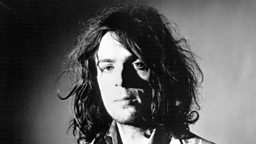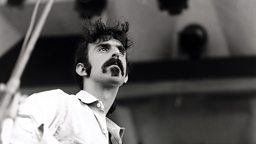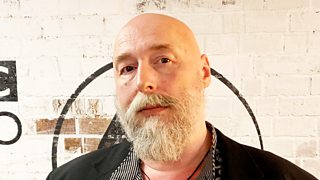6 musicians who inspire graphic novel legend Alan Moore
By Jamie Milton, 7 October 2019

6 Music is celebrating the world of comics and graphic novels this October, with the genre's finest creators sharing the music that’s inspired them.
In Alan Moore’s Paperback Writers (available to hear until Fri 1 Nov), the comic book legend is joined by writer and producer Richard Norris to share his passion for music, magic, art labs and plenty else in between.
Many of Moore's influential works – Watchmen, V for Vendetta, From Hell and The League Of Extraordinary Gentlemen – have been adapted for film and television (although sometimes against his will), and they are widely considered to be some of the greatest graphic novels existing today.
Through his rise via the underground to his impact on mainstream culture, Moore has been inspired by countless musicians, both through their art and their attitude to innovation and creativity.
Here are six acts he admires, some of whom he references in his own work...
Brian Eno

In 2017, Moore interviewed Brian Eno for Radio 4 series Chain Reaction. “For most of it, I was just throwing myself at his feet. It was probably embarrassing. The poor man!”
Of course you can hear dusty shoes on the radio, if Brian Eno says soAlan Moore
“Brian Eno is one of the people I admire more than anybody else in the pop world, just because of his thinking,” Moore says. “It’s not just applicable to music, you can use it in any discipline. Meeting him was tremendous.”
Moore asked Eno if he still uses Oblique Strategies cards, his 1975 release with Peter Schmidt whereby each card contained a daily challenge or rule, to help inspire artists. “He said that yes, he still used them every day. He’d pick a card and abide by the instructions of that card.”
The card for that specific day said “Change Nothing,” so he turned up for their interview in the same outfit as the previous day. “Just as we were about to go on the radio, he noticed my shoes were cleaner than his. So he got down, pulled out a handkerchief and cleaned them up. I said: ‘This is radio.’ He looked at me and said: ‘Oh, so you don’t think you can hear dusty shoes on the radio?”
“My entire reality turned inside out. I realised my naivety; yes, of course you can hear dusty shoes on the radio, if Brian Eno says so. He’s a lovely man and one of the most brilliant musicians and thinkers of our time.”
Patti Smith

If Moore found himself starstruck by Brian Eno upon their encounter, it wasn't a one-off. He had a similar experience with legendary New Yorker Patti Smith, who invited him to take part in her self-curated Meltdown Festival in London, back in 2005.He describes it as “one of the greatest highlights of my mortal existence thus far. I got to hug Patti Smith. How great is that?!”
“The first Patti Smith album (1975’s ‘Horses’) was one of those where the first time I heard it, there was a shock. Not revulsion, but something like that. Something where you’re so startled by a thing, you don’t know whether you like it or not. And then you quickly realise that you like it more than anything else.”
“She is an extraordinary woman, an extraordinary performer, and a terrific poet.”
Annette Peacock

The Brooklyn composer is one of the great living experimenters, combining her voice with one of the first Moog synthesisers on ground-breaking 1972 album ‘I’m the One’, which boldly merges blues and electronic music.
“When it first came out... I was very much impressed with synthesisers," Moore recalls. "I was hearing about things as they came out and I took a punt on the Annette Peacock album. It’s the kind of album, the kind of voice, that just sucks you into a beautiful velvet vortex. There’s an incredible emotion in it.”
Moore considers Peacock’s work to be somewhat overlooked. “Any great piece of art or music; it almost suggests a possible future that never came. If people had paid more attention to this track (the title-track from ‘I’m the One’), what would music be like? That’s the kind of thought experiment that is very entertaining but probably fruitless.”
Syd Barrett

“I am a huge fan of Syd Barrett,” Moore says of the late psychedelic songwriter. “He was really the only thing that attracted me to Pink Floyd.”
He believes the mythology around him (viewed by some as “crazy Syd Barrett”, where the outside world knew little about his private life) has been misconstrued. “Looked back upon from a present day perspective, a lot of that just looks like artistic integrity, and simply not wanting to be commercial.”
He cites 1970 solo album ‘The Madcap Laughs’ as brutally, but beautifully, documenting a trip away from reality. “It has this marvellous – for the listener, perhaps not so much for him – falling to bits quality, of breaking down into incoherence. It’s so fragile and beautiful.”
Sleaford Mods

A more contemporary nod, Sleaford Mods’ band name was once mistaken by Moore to be “The Sleep of The Mods.” He puts it down to being “an old man, increasingly out of touch with the world… I think I was thinking of Goya’s illustration, ‘The Sleep of Reason Produces Monsters’.”
You might not want to listen to them, but you should. You really should.Alan Moore
“They are included here just to show that I have heard of some music that has occurred during the last 10 years,” he claims. "But also because they are about my favourite modern band.” His argument for their music’s vitality is genuinely compelling.
He admires the mouthy duo’s stageshow – “It’s a great act: two guys, one of them turning on the music, and then just drinking a can of beer. That is elegant, isn’t it?” – as well as their genuine, working class authenticity. “There are very few working class voices in any medium,” he says.
“It feels to me that if the working class are ever discussed – generally by a middle class person – then there seems to be only two registers that people can adopt. ‘Oh, these poor people… Isn’t it terrible what’s happened to them? Of course, we can’t do anything about it, but let’s sympathise.’ This casts them as victims. The other way of perceiving [the working class] is as scum that we’d be better off without. People who are ‘unsightly’, ‘inconvenient’, or ‘dragging down the rest of us.’ Of course that’s not the way working class people see themselves. Because just like anybody else, we are all heroes in our own narrative.”
“Working class voices like the Sleaford Mods, that are as intelligent and cutting as any academic critic of our current social situation; that’s the stuff that makes people sit up and take notice. You might not want to listen to them, but you should. You really should.”
Frank Zappa

Moore grew up through the “hippie, psychedelic era”, and he thinks Frank Zappa brought an “indispensable” satire and scorn to proceedings, and an acute social commentary.
“He made it so that it was about love, peace, flowers and battery acid,” he jokes. “As well as being a brilliant musician, [he had] an incredibly funny imagination. He was holding up a mirror to the worst excesses of the 1960s culture and movement.”
Moore’s wife, fellow comic writer Melinda Gebbie, was partly a target of Zappa’s ire. “She was a Haight Street runaway in 1967. She was an archetypal flower child. She loves San Francisco. She thought that ‘Who Needs the Peace Corps’ is one of the funniest things she’s ever heard, because it is absolutely true.” The song takes aim at a hippie culture that had become saturated and commercialised. In the song, Zappa sings: "First I'll buy some beads / And then perhaps a leather band to go around my head / Some feathers and bells / And a book of Indian lore."
“By that time, on Haight Street, they were opening a “Peace & Love” pizza company," Moore remembers. "It was obviously all over.”
6 Music's Graphic Content season
-
![]()
Neil Gaiman
The author of Sandman, Good Omens and American Gods among much else, picks some of the music that's shaped him. With tracks from Bowie, Dusty Springfield and Tori Amos.
-
![]()
Hannah Berry
The UK's current Comics Laureate shares a selection of music that means something to her. The graphic novelist, writer & illustrator includes Bjork & Tom Waits in the mix.
-
![]()
Warren Ellis
The comics writer, novelist & screenwriter picks the music that represents him & his work, with tracks from Delia Derbyshire, Billy Bragg and Neu!



